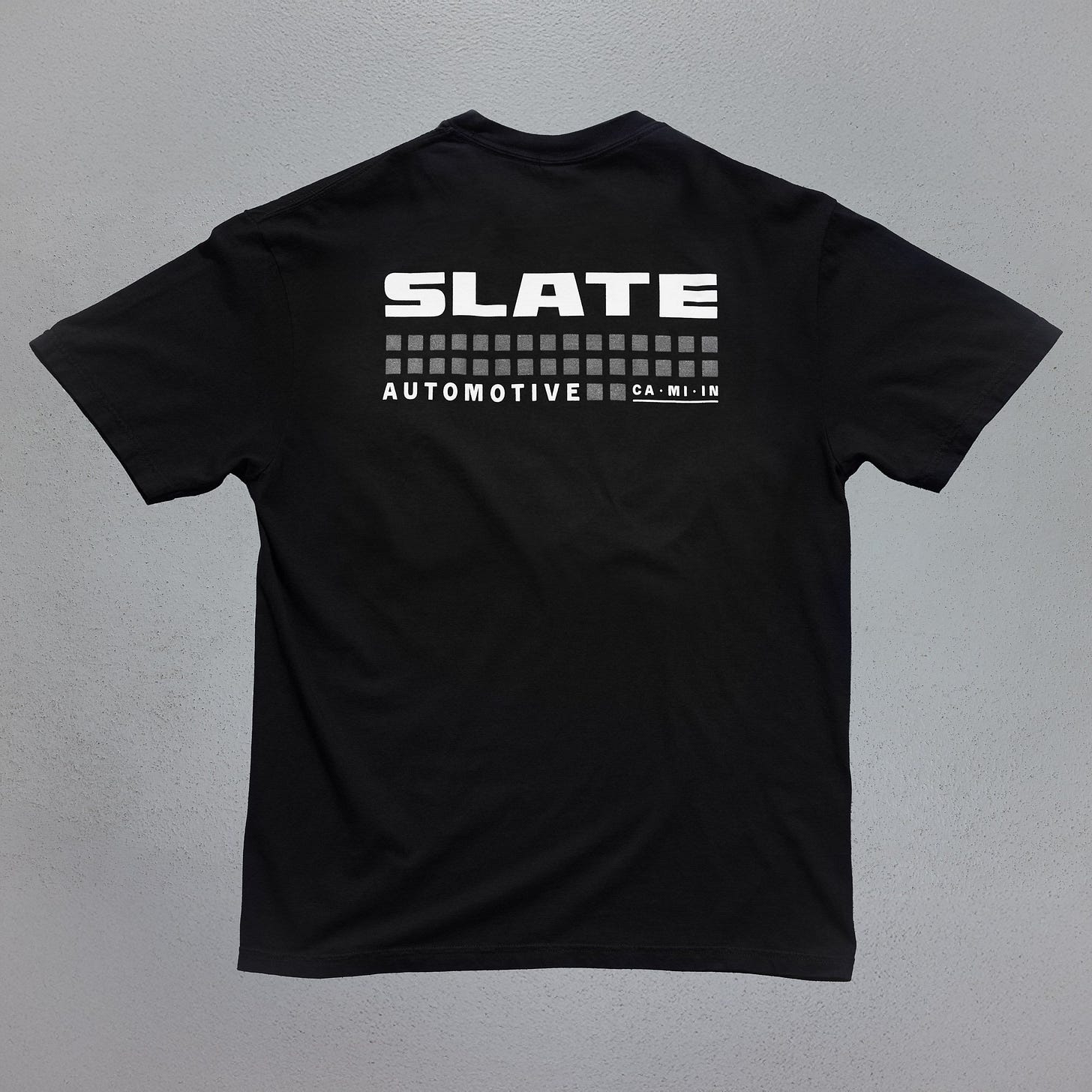Welcome back to Naming Briefs, a semi-regular feature in which I scrutinize and analyze notable corporate or product names. This is the fifteenth installment of Naming Briefs and the first time I’ve looked at a pair of doppelnamers: one brand name shared by two wholly distinct brands. Here’s Naming Briefs #14, which will lead you to previous installments. Here’s some background on the series.
A brand name doesn’t need to be unique to pass legal muster: it just needs to be distinctive within its trademark class. Case in point: Dove soap and Dove chocolate, owned by different parent companies and coexisting on separate supermarket aisles. That bird gets around!
Another case in point: the two distinct SLATE brands we’re looking at today.
Slate Auto.
Want to buy a new, no-frills, made-in-America electric pickup truck? You’re in luck: Demo models of this rare beast have already been sighted in the wild, and a full shipment of trucks will be rolling off the assembly line sometime in late 2026. To claim one of your own, just plunk down a $50 deposit and join the waiting list.
That’s what automotive writer
did recently, joining about 100,000 prospective buyers in the queue. She wrote about the venture, and her reasoning, earlier this week: “It’s $50 well spent to lift the lid on a buzzy new vehicle.”The name of that work-in-progress EV: SLATE.

Slate Auto was founded in Troy, Michigan, in 2022; principal funding came from Bezos Expeditions, Jeff Bezos’s personal investment portfolio company. Other investors include Los Angeles Dodgers owner Mark Walter and billionaire entrepreneur Thomas Tull. The company operated in stealth mode before revealing the truck in Venice, California, on April 22, 2025.1

The Slate truck was originally called Re:Car, a nod to Re:Build Manufacturing, the Massachusetts-based domestic manufacturing incubator co-founded by a former CEO of Amazon’s consumer division. Changing the name to Slate was smart: “Car” is generic and doesn’t adequately suggest “pickup truck,” which is the only model the company will make. And the colon in the middle of Re:Car is silly, a little pretentious, and apt to be omitted or misunderstood.
Slate, on the other hand, has simplicity and resonance going for it. It’s a relatively old word, imported in the 1400s from Old French esclate, its meaning originally restricted to “thin, rectangular stones often used for roofing.” It’s not hard to look at the squarish, slim-profiled Slate EV and imagine something chiseled from stone.
But I suspect Slate Auto wants you to think instead, or additionally, of a different slate. Before cheap paper was widely available, slates were used for writing, especially by schoolchildren; “clean slate” — a fresh beginning — is the English translation of tabula rasa, something (say, a human mind) that exists in its original, pristine state.
In fact, Slate Auto has applied for trademark protection for “BLANK SLATE,” and its already using the phrase in marketing:
IT’S A BLANK SLATE. YOU CALL THE SHOTS.
We believe you should decide how to spend your money, not us. So, while other auto companies make bigger, pricier, feature-packed cars, we made a blank Slate. A vehicle in its essential form, without all the unnecessary stuff that adds to the price tag. Less cluttered, more useful. It's a blank canvas for personalization, so you can get exactly the Slate you want, with the stuff you want, at the price you want.
All in all, a solid name — if not an especially exciting one — on which to build a brand. Let’s be grateful the vehicle wasn’t named the Bezos or the Amazon Truck. And let’s also take a minute to appreciate that SLATE is an anagram of, and maybe a retort to, TESLA.
Slate.com.
Given the evocative properties of slate, it’s not surprising that the word is hugely popular as a brand name. It shows up several thousand times in the trademark record, in categories from dental floss to credit cards to high-protein canned milkshakes (“Giving chocolate milk a clean slate”) to a Banana Republic fragrance for men.
There’s only one Slate dot com, though,2 and that’s Slate magazine.
This Slate was founded (as all-capitals SLATE) in June 1996 by Microsoft as part of its MSN web portal; it was sold to the Washington Post Company in 2004 and since 2008 has been managed by The Slate Group. It’s one of the oldest continuously operating web-only general-interest publications, or “webzines,” as they were originally called. It was also an early adopter of the podcast model: it launched its first podcast almost 20 years ago, on July 15, 2005. Its past and present contributors represent a Who’s Who of contemporary American journalism and letters: Franklin Foer,
, Farhad Manjoo, Dahlia Lithwick, Tom Vanderbilt, Patrick Radden Keefe, Dana Stevens, Emily Bazelon, and many others.Slate’s founding editor, Michael Kinsley3, published a long welcome letter on the site on June 25, 1996. It’s still up, and I was curious whether it had to say about the Slate name.
I was . . . disappointed:
The name? It means nothing, or practically nothing. We chose it as an empty vessel into which we can pour meaning. We hope SLATE will come to mean good original journalism in this new medium. Beyond that, who knows? Good magazines are exercises in serendipity. Credit–or blame–for the name “SLATE,” by the way, goes to David Weld, then of Microsoft, now of Cognisoft Corp.
A Seattle cyberwag says that the name “SLATE” is appropriate, because whenever he asks anyone from Microsoft, “How’s your project coming along?” the answer he usually gets is, “’s late.” SLATE, in fact, has been reasonably prompt. Less than six months ago, it was a four-page memorandum and a single Internet naif. SLATE is not the first “webzine,” but everyone in this nascent business is still struggling with some pretty basic issues. Starting an online magazine is like starting a traditional paper magazine by asking: “OK, you chop down the trees. Then what?”
This strikes me as disingenuous: “Kodak” and “Zoosk” are empty vessels — coined words with no inherent meaning — while “Slate” is a dictionary word with plenty of real-world connotations, including “a surface on which to write.” In other words, it was never a blank Slate. Kinsley missed an opportunity to tell a credible, compelling story.
As for the man behind the Slate name — well, he has an interesting name story himself. Slate published a profile of David Weld in June 1997. It begins:
David Weld is a nephew of William Weld, the former governor of Massachusetts. He is a grandson of David Weld, the founding partner of White, Weld, the once-great Wall Street investment bank. He grew up, as Welds often do, in New York City and was educated, as Welds often are, at Andover. At every step of his early life he was groomed for his seat at the high table of American WASP culture.
He’s now, the piece concludes, a “millionerd” — a quaintly modest moniker in our new era of broligarchs and superbillionaires.
The author of that Weld profile, by the way, is someone you may have heard of: Michael Lewis. Back in 1997 Lewis was working his way up the editorial ladder, having published his first book, Liar’s Poker, in 1989. His breakout success, Moneyball, would come in 2003. A few years later Graydon Carter hired him to write for Vanity Fair, where he famously earned $10 a word for his long-form journalism — considerably more, I’m guessing, than he’d made at Slate, and more than almost any other American journalist alive at the time, or now.
On the Autopian blog, reporter David Tracy called it “the craziest automotive debut I’ve ever seen.” No showroom, no glamour: The truck was simply parked on Abbot Kinney Boulevard. Tracy: “Yes, it’s an extremely trendy street in a popular part of the LA metro area, and yes the car was wrapped in an extremely strange livery for a fake service company that drives babies around on the car’s roof to get them to fall asleep, but still: This was a relatively subtle way to show a new company’s first car.” Photos of the “Cryshare” truck here.
Slate Auto’s URL is Slate.auto. As I’ve said many times, a dot-com domain isn’t your only ticket to brand success.
That would be the same Michael Kinsley for whom the Kinsley gaffe — “In American politics, an occurrence of someone telling the truth by accident” — is named. See my 2011 post.





I'm sure the name genesis stories are meant to convey insight to deep thoughts. Yet they bring along so much more.
Bezos likes the re: prefix -- the yearly AWS conference is named re:Invent, and they also used that name for one of the Amazon buildings in downtown Seattle.